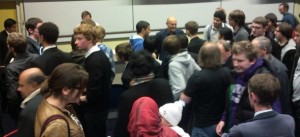 On November 3rd this year, Professor Jim Al-khalili was to give three lectures in Liverpool on the same day (Quantum Physics, Advances in Mathematics in Medieval Islam and On the Shoulders of Eastern Giants: the Forgotten Contribution of the Medieval Physicists). I did feel a bit of a stalker, I attended all three, but fortunately I was not alone.
On November 3rd this year, Professor Jim Al-khalili was to give three lectures in Liverpool on the same day (Quantum Physics, Advances in Mathematics in Medieval Islam and On the Shoulders of Eastern Giants: the Forgotten Contribution of the Medieval Physicists). I did feel a bit of a stalker, I attended all three, but fortunately I was not alone.
It is not often that I get to witness the scientific method in real life personally. The most illuminating part of the day of the three lectures was the Q&A following the second lecture. A questioner put her hand up and stated clearly that she had a correction, not a question. She had heard the professor discuss the concept and symbol of the number zero. During his lecture, the professor had recalled the contributions from the Babylonians, Mayans and Indian mathematicians. The questioner had been researching the substantial Egyptian contribution to this area, which the professor had not mentioned. What happened next was an affirmation of the scientific method.
The professor could have been defensive, confrontational or dismissive. Instead, he listened to her argument and asked her to stay behind to so he could learn details of her research. That is the power of the scientific idea. It stands only on the edifice of evidence and not the economic wealth, social position or academic reputation of those who hold it.
The progress of scientific knowledge is not continuous and linear but evolves through a series of stops and starts. Thomas Kuhn, in his 1962 book “The Structure of Scientific Revolutions” described the progress of science as periodic “paradigm shifts”. He was referring to the fundamental differences in thinking that have led to leaps in scientific understanding.
Could that stop-and-start concept describe how science develops through the ages, too? Scientific discoveries are frequently lost, forgotten or deliberately suppressed. So the story of scientific discovery is frequently a story of rediscovery. William Harvey ‘s discovery in 1628 of the human heart and circulation of blood though the human body had much in common with that of Ibn al-Nafis 400 years earlier. Nicolas Copernicus is credited in the 16th century with introducing the heliocentric system (placing the Sun not the Earth, in the centre of the solar system) but this idea had been propounded by Aristarchus in the third century BC.
The omissions are not just in science. One example of technological development lost for over a thousand years that sticks out like a sore thumb is the Antikythera mechanism, a device for calculating and displaying relative positions of the Sun, Moon and planets. The precision of the internal mechanism would not be repeated for over a thousand years.
Why these omissions occur is unclear. History, like science, is always a work in progress. Reflecting on why the ancient Greek tradition of scientific method stalled, Carl Sagan, in his celebrated work, Cosmos, concluded that their society was elitist and self-serving. Key figures like Plato were hostile to experiment and perpetuated the idea that human thought alone was sufficient to explain the physical world. This intellectually corrupt approach sustained their slave, unjust society. Search for truth was not their goal.
In his new book “Pathfinders” Professor Al-Khalili attempts to fill “a” gap in the history of science by revisiting the work done by the Arabic scholars during the period known in Europe as the dark ages. It is not a story of Islamic science but of science conducted in the Arabic language which has its roots in Islam. For around 600 years (from 9th to the 15th century), sandwiched between Greek and Latin, the international language of science was Arabic.
A professor of theoretical nuclear physics in the University of Surrey, he was born in Baghdad to a Christian mother and a Muslim father. As an atheist, Jim Al-Khalili emphasises the role of Islamic, Persian, Christian and Jewish scholars who not only translated the work of the ancient Greeks but also enhanced and developed it. Just as the ancient Greeks took the concept of an alphabet from the earlier Phoenician civilisation and developed the written language, the scientific (re)discoveries we traditionally associate with the European Renaissance were built in turn on the progress during this golden age of Arabic science.
Professor Jim Al-Khalili has his own podcast, but here is a recording we made for this one just prior to the start of his three-lecture session. To start off with, I asked about his personal interest in astronomy.
_________________________
The quote for this episode is from the Prophet Mohammed and is in chapter 2 of Pathfinders.
“The ink of the scholar is more sacred than the blood of the martyr”
Podcast: Play in new window | Download (Duration: 19:20 — 17.7MB) | Embed
Subscribe: Apple Podcasts | Spotify | RSS | More